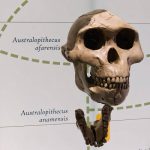Early human ancestors had huge size gaps between males and females, fossil study finds
A new study reveals that some of our earliest human ancestors showed extreme differences in body size between males and females—much greater than in...
How the universe’s first chemistry helped spark the first stars
Right after the Big Bang, about 13.8 billion years ago, the universe was a hot, dense sea of energy and particles.
But in just a...
What sick cats are teaching us about long COVID
A serious disease in cats may help scientists better understand long COVID in humans.
The disease, called feline infectious peritonitis (FIP), is caused by a...
New findings indicate that the origin of life started in space
Using the Atacama Large Millimeter/submillimeter Array (ALMA), an international team of astronomers announced the detection of 17 complex organic molecules (COMs) in a protoplanetary...
Ancient dinosaur footprints reveal surprising herding behavior
New dinosaur footprints found in Canada suggest that different species of dinosaurs may have traveled together in herds—similar to how zebras and wildebeest move...
Ancient fossil reveals spiders may have come from the sea
A remarkably well-preserved fossil is challenging what scientists thought they knew about the origins of spiders and their close relatives.
New research suggests that arachnids—spiders,...
Ancient Neanderthal gene still affects muscles and athletic performance today
A new study has found that a gene variant inherited from Neanderthals still affects the muscles of some people living today—especially when it comes...
Why Saber-toothed tigers vanished: It wasn’t just the ice age
New research from scientists in Brazil is shedding light on the long-standing mystery of why saber-toothed tigers went extinct.
According to two new studies from...
Electric weed control works as well as chemicals—without the chemicals
A new study from Western Australia has found that using electricity to kill weeds can be just as effective as using herbicides or mechanical...
Dinosaur wrist discovery reveals new clue to how flight evolved
Scientists have uncovered a surprising piece of the puzzle in the evolution of flight: a tiny wrist bone in certain dinosaurs that may have...










